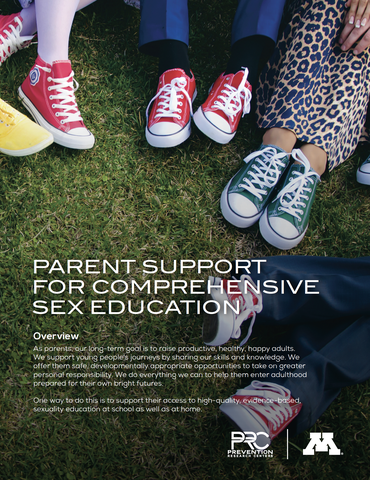Minnesota Parents Continue to Show Support for Comprehensive Sexuality Education
Building on a survey conducted in 2006, Marla Eisenberg (Department of Pediatrics, U of M Medical School) collaborated with HYD-PRC Community Outreach Coordinator, Jenny Oliphant, Senior Evaluator, Shari Plowman, and Center Director Renee Sieving to survey today’s parents of school-age children regarding their views on school-based sex education. Using a variety of methods, they surveyed over 700 parents from diverse communities and found that 90% of Minnesota parents want public school teachers to teach abstinence AND science-based, comprehensive sexuality education. This high level of support is unchanged over the past 15 years, as detailed in their recently published Journal of Adolescent Health article.
Support for comprehensive sexuality education was high among parents from all types of backgrounds, including racial and ethnic groups, religions, and income and education levels. Of note, a majority supported comprehensive sexuality education across the political spectrum: 57% of parents who described themselves as “very conservative” politically shared this view, and support was high even in Minnesota’s most conservative legislative districts.
The team queried parents about a range of different topics that are common in comprehensive sexuality education programs, such as puberty, reasons to abstain from sex, sexually transmitted infections, pregnancy prevention, consent, abortion, sexual orientation and gender identity. Support for including each topic in school curricula was high – over 95% - for most subjects. Support for topics that are sometimes considered too controversial to include in school-based sexuality education programs (i.e. abortion, sexual orientation, and gender identity) was still high, with at least 70% of parents indicating they should be taught. Moreover, parents thought topics should be introduced fairly early in school. For example, almost 2/3 of parents thought pregnancy prevention should be introduced prior to 8thgrade. For sexual orientation and gender identity, almost a quarter of parents thought these topics should be introduced in elementary school (grades K-5). Eisenberg commented, “When we asked generally and then followed up with specifics, we got a clear and consistent message from parents. They want young people to learn about many aspects of sexuality, and want this learning to start early, and in an age-appropriate way.”
Currently, Minnesota’s sex education offerings vary widely from district to district, and even school to school. No statewide policies require the comprehensive sexuality education that parents want. Educators and local school policy personnel may be concerned about parental backlash if they teach content that is considered controversial. “Parents are echoing what we hear from young people. They want comprehensive sex education. It isn’t controversial - it’s curriculum long overdue,” said Oliphant.
Eisenberg and team have put together two guides aimed at educating decision-makers at school, district, and state levels, so they know that the overwhelming majority of parents would support inclusion of comprehensive sexuality education in Minnesota schools.
